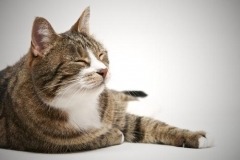Emergency Vet Clinic in Brampton, Highway 10
Caring For Your Senior Cat

Cats can and often do develop arthritis, renal conditions, joint deterioration and other such troubles as they age. As such, it is up to us as responsible pet parents to give our cats the care they need as their bodies and needs change during their senior years.
Diet
It sounds reasonable that when a cat hits a certain age of approximately 8+ years they would be gradually switched to a senior diet of cat food. If only it were so simple.
Not all senior cats will have the same dietary needs, nor do all senior diet cat foods contain the same nutritional benefits. The best way to discover what any particular cat requires from its food as it ages is to consult a veterinarian yearly for nutritional advice. Through examinations, bloodwork, or fecal and urinary testing, a veterinarian can can detail precisely what an aging cat’s nutritional needs are, covering such topics as:
- suggested caloric intake, with cats requiring fewer calories in their diet as they age
- changes to levels of proteins, fats and fibre
- additional supplements to target specific conditions, such as fatty acids for mental acuity and health or glucosamine and chondroitin for ailing joints
- dietary prevention or management of chronic conditions such as diabetes or kidney disease
- weight management techniques and portion control for an increasingly sedentary lifestyle
With the assistance of a veterinarian to help pet owners stay informed, our feline pets can grow old gracefully and with the dignity they deserve.
Changing Energy Levels
Just as humans do, when cats grow older their energy levels tend to reduce over time. A previously highly active cat may curtail the amount of play they fit into a day, while cats that enjoyed to go for a roam outside frequently may well decide they prefer to stay inside.
As our feline friends begin to sleep more and eat less, decide against performing as many acrobatic feats across fences, countertops or leaps to the top of the bookcase, we need to work towards accommodating these lifestyle changes too.
Accessibility Standards
A cat showing less interest in play is also not only just about a reduction in energy level. As the body gets older, most cats will suffer from some form of arthritis or deterioration of joint health. Those high leaps become unthinkable, and even jumping up to the couch can be painful. When a cat begins to show signs of discomfort from activity or an unwillingness to make those previously effortless leaps, consulting with a veterinarian is the first course of action.
Secondarily, there are many ways that one can increase the level of accessibility at home for aging cats. With the primary goal of making their life more comfortable and enjoyable, homes can be reviewed from a cat-centric perspective and minor adjustments made to accommodate for their conditions, including:
- the use of low-grade ramps that allow a pet to walk up to their favourite couch, bed or chair
- introducing a low lying litter pan for ease of access
- allowance of all elderly cats' amenities to be on one floor of the home, reducing the need for stairs if they are painful
- placing of food and water on the floor
- providing a comfortable cat bed on the floor of any room they prefer to sleep in or be sociable in, ensuring that even if they are tired and sore they can still be part of the family
As cats become senior, regular checkups with the veterinarian become of vital importance, with a physical and bloodwork done at least yearly. These scheduled visits can monitor for age-related health conditions and a cat’s overall wellness as they continue aging. To the untrained eye it can be very difficult to tell when cats are ill, they are experts at hiding weaknesses.
If you have an aging cat, talk to your vet today about how you can give your cat the quality of life that years of friendship and companionship merits.